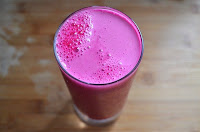
Brain-Healthy Foods to Fight Alzheimer’s
VIDEO+TRANSCRIPT: What are the best food sources of lutein, the primary carotenoid antioxidant in the brain?

VIDEO+TRANSCRIPT: What are the best food sources of lutein, the primary carotenoid antioxidant in the brain?

A daily cup of tea — and other delicious options — could help you to enjoy better health late in life. Read on to learn more.

Ketone-rich diets increase the SIRT3 protein that protects neurons from death during the progression of Alzheimer’s disease. But how does it work? Find out more.

DRINKING beet juice can increase blood flow to the brain in older adults. The way beet juice does this holds great potential for combating dementia.

HEALTH CHART + 2 VIDEOS + ARTICLE: In 4,000 elders, nuts boosted cognition by 60% and delayed memory decline by 2 years. See the “Healthy

DIET VIDEO: Blueberries can significantly improve cognitive performance within hours of consumption. How solid is the science?

DIET: In a new study of people age 50 and older, eating certain fruits and plant-based foods over 20 years helps significantly lower Alzheimer’s and

VIDEO + ARTICLE: Researchers say a health lifestyle aimed at reducing frailty could help prevent dementia, even among those at high genetic risk for dementia.

ALCOHOL: It’s well known that a little red wine each day lowers dementia risk. But just how bad is overdoing it? This study of 6,000

UCLA researchers found active people build 5% more gray matter in their brain. See how this prevents Alzheimer’s.

Learn about The Alzheimer’s Society of Canada’s campaign to bust the stigma of dementia.
Discover 6 easy ways you can make a difference.

WellnessCheck is a brief, friendly assessment, designed to help you understand your current cognitive wellness. It takes about 3 minutes and covers memory, mood, and focus.

Alzheimer’s is the most common type of dementia, but it is just one cause. In this short Q & A, watch Stanford Neurologist Dr. Kerchner explain the importance of getting an accurate diagnosis.

The “glymphatic system” removes brain waste. It may be a powerful new target to treat Alzheimer’s. Learn why scientists believe Alzheimer’s may arise when the system is not doing its cleaning properly.

Plaques are the best-known Alzheimer’s culprit. Cambridge scientists have figured out the 7 steps to forming these plaques. Find out how targeting the formation of these “oligomers” may hold the key to a cure.

UCLA researchers found active people build 5% more gray matter in their brain. See how this prevents Alzheimer’s.
No spam, only news and updates.


